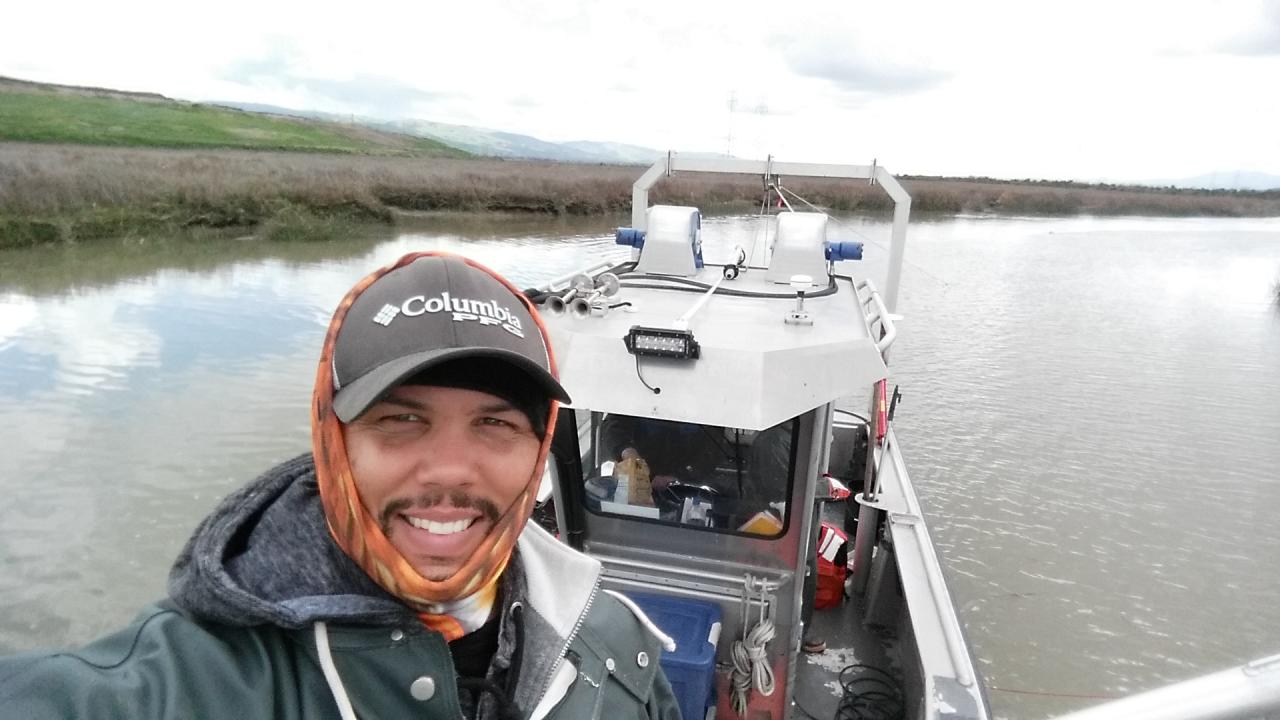
Dr. Levi Lewis receives the UC Davis Award for Excellence in Postdoctoral Research
9/1/2020
Please join us in congratulating Dr. Levi S. Lewis, a Coastal and Marine Sciences Institute affiliate who was recently awarded the UC Davis Award for Excellence in Postdoctoral Research. This award was created by the UC Davis Postdoctoral Scholars Association to recognize the vital role that postdoctoral scholars play in maintaining the reputation of excellent research at the University of California, Davis.
About Dr. Lewis
Levi Lewis is currently a 4th year postdoc and Delta Science Fellow in the Wildlife, Fish & Conservation Biology (WFCB) Department, and his path to postdoctoral research at UC Davis has been like a homecoming in many ways. As an undergraduate, Dr. Lewis studied at UC Davis in the WFCB Department in the UC Davis College of Agricultural and Environmental Sciences under advisor Dr. Peter Moyle, later going on to receive his Master’s at San Diego State University. He completed his Ph.D. at Scripps Institution of Oceanography, UC San Diego, in 2016, then returning to UC Davis as a postdoctoral researcher in WFCB. Since then, he has coauthored 9+ peer reviewed articles, formed new cross-department and agency collaborations, and mentored countless students and interns.
The nomination for this award was particularly meaningful and moving, according to Dr. Lewis, because of the close connection to his mentors at UC Davis: Dr. Peter Moyle, Dr. Jim Hobbs and Dr. Nann Fangue. These connections, in the case of Peter Moyle and Jim Hobbs, began during his time at UC Davis as an undergrad and make this nomination a particular honor. Dr. Lewis is now the Lead PI of the Otolith Geochemistry & Fish Ecology Laboratory (formerly Hobbs Lab) and manages a staff of 12. Dr. Lewis also credits the support of his peers, including Malte Willmes, a postdoctoral researcher at UC Davis, and Randall Baxter, one of his mentors outside of UC Davis, for their support in his postdoctoral research efforts.
Research and Results

In 2018, Dr. Lewis was awarded a Delta Science Fellowship through California SeaGrant, allowing him to act as Principal Investigator on his own project under the mentorship of established researchers (Dr. Jim Hobbs and Dr. Nann Fangue, UC Davis). In this fellowship, Dr. Lewis focused on Longfin Smelt, a native Californian species experiencing rapid population decline. Using otoliths (“fish earstones”) to measure growth rates and provide valuable information about their life history, habitat interactions, and stressors, and by employing geochemical tracing to map migration history, the findings from this study helped further understanding of habitat sustainability and the effects of human activities on Longfin Smelt populations, and will better inform conservation efforts for the species.

Masterful Science Communication and Collaboration
One challenging and important aspect of working in the sciences is honing the ability to effectively communicate about science to a wide variety of audiences, and Dr.
Lewis’ mentors had much to say on that topic when nominating him for this award. As Dr. Nann Fangue (Chair, Department of Wildlife, Fish & Conservation Biology, Professor of Physiological Ecology, University of California Davis) put it, "He is easily the most effective postdoc that I’ve encountered at communicating his science to agencies and getting his science incorporated into active policymaking."
His peers echo this sentiment and expand on the convergence of skills and talents that they see in Dr. Lewis. Dr. Malte Willmes, a postdoctoral researcher at UC Santa Cruz and coauthor with Dr. Lewis on recent publications about the influence of hatchery origin fish on wild salmon populations, the return of Chinook Salmon to the UC Davis Putah Creek Watershed, and growth and migration of Longfin Smelt, shared these thoughts about working with Dr. Lewis:
“Levi is equally at home in the field, fishing and collecting samples, as he is in the chemistry lab, operating the laser-ablation mass spectrometer, and in the meeting rooms presenting research and building new collaborations. He is focused to see the research implemented and dedicated to recover our threatened and endangered fishes in California. What really sets him apart though is his mentorship for students and staff, and through his enthusiasm and passion for science has had a profound impact on my career.”
- Malte Willmes
Congratulations to Dr. Lewis for this well-deserved award, and thank you for sharing some of the history and work that went into it with us!
